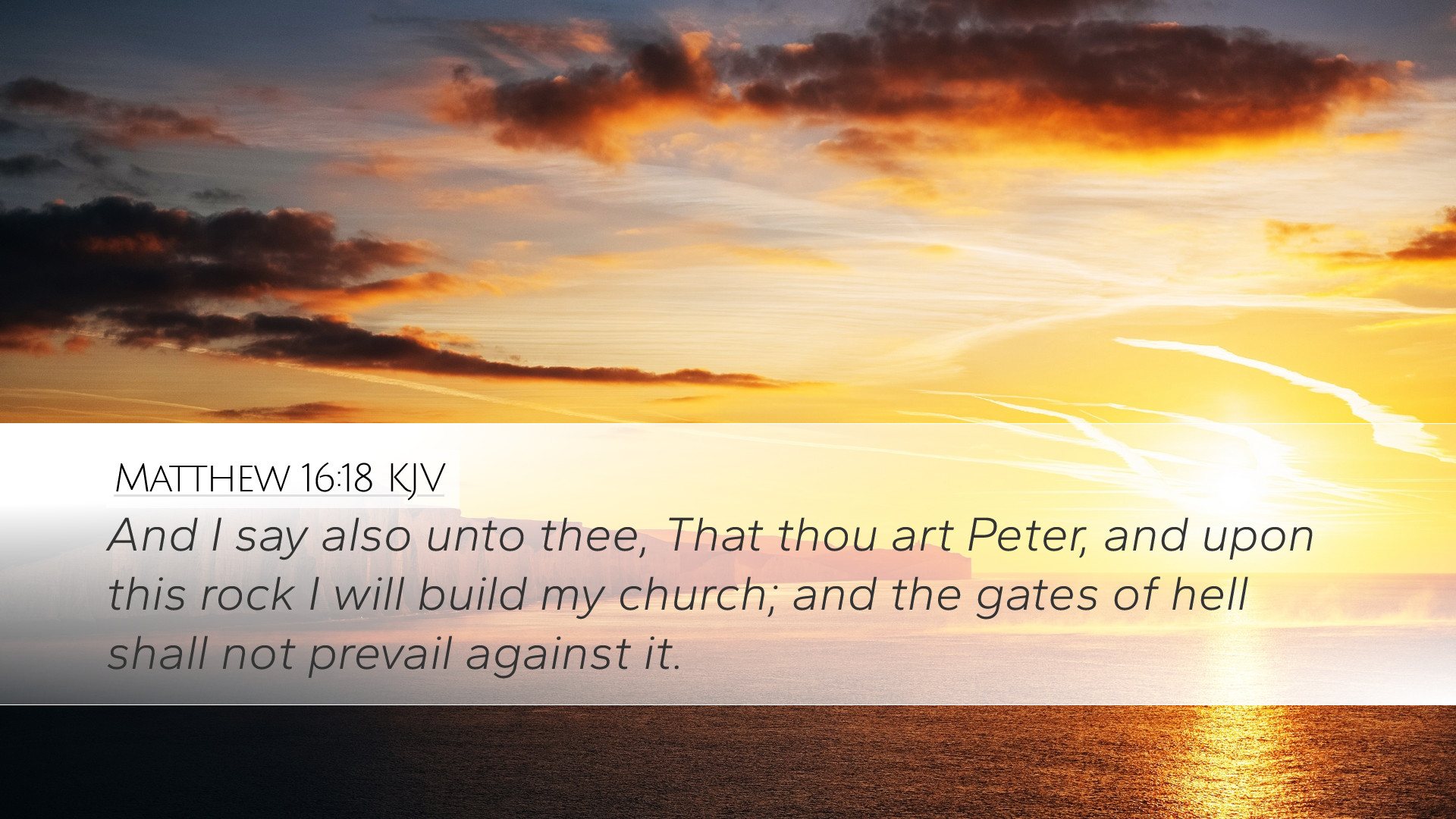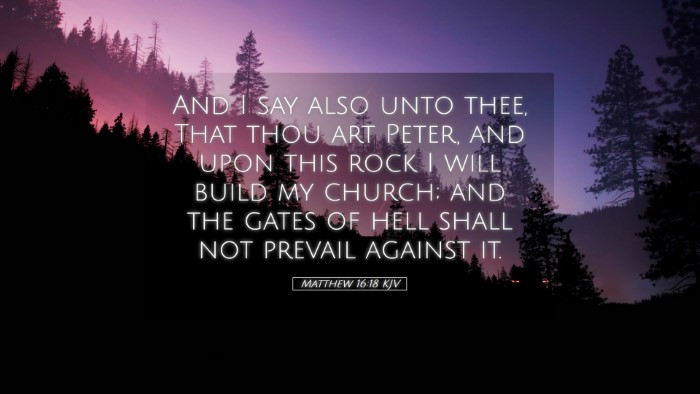Commentary on Matthew 16:18
"And I say also unto thee, That thou art Peter, and upon this rock I will build my church; and the gates of hell shall not prevail against it."
Introduction
The verse Matthew 16:18 marks a monumental declaration by Christ regarding the nature and foundation of the Church. It establishes the pivotal role of Peter—the 'rock'—and emphasizes the Church's resilience against the forces of evil. Scholars and theologians have long appreciated the depth of this verse, as it encapsulates Jesus' intent for His followers and the entity they were to form.
The Name Peter
Matthew Henry notes the significance of the name 'Peter', derived from the Greek word 'Petros', which means 'rock'. This name change signifies a transformation in Peter's identity and mission. Jesus' acknowledgment of Peter not just as a disciple, but as a foundational figure of the Church, indicates a divine purpose for his life.
Adam Clarke expands upon this, suggesting that the use of the name 'Peter' delineates a relationship between Christ and the believer. Just as Peter's role is foundational, every believer is called to contribute to the building of the Church.
The Rock of the Church
Jesus declares that He will build His Church upon this rock. The interpretation of 'this rock' has sparked diverse theological discussions. Albert Barnes presents the opinion that this 'rock' refers to Peter himself as the leader of the apostles and the early Church. However, he emphasizes that it ultimately reflects the confession of faith in Christ that Peter has just made—acknowledging Jesus as the Messiah.
Conversely, Matthew Henry argues that the 'rock' signifies Christ Himself. He explains that while Peter has a significant role, it is upon Christ's own person and work that the Church is truly built. Thus, the stability of the Church rests not solely on human leadership but on divine strength.
The Nature of the Church
This verse also tells us something crucial about the Church: it is not merely an organization or a building, but a living entity—a community of believers gathered around the truth of Christ. Adam Clarke reflects on this aspect by stating that the Church is an assembly of people who are united in faith and purpose, dynamically interacting and sustaining each other through their collective trust in Christ.
Moreover, Matthew Henry emphasizes that the promise "the gates of hell shall not prevail against it" assures believers of the Church's ultimate victory over adversity. This underlines that the Church, as a manifestation of God's kingdom on earth, is indefatigable and eternal.
The Gates of Hell
The phrase "gates of hell" is often interpreted as referring to the powers of death and evil. The term suggests an active opposition to the Church from the forces of darkness. Albert Barnes indicates that this should not cause fear within the Church but rather a profound confidence: it illustrates that, through Christ's authority, the Church will triumph over all forces that seek to undermine it.
Matthew Henry adds that while the struggles may be intense, the promise of Christ reassures that these efforts will ultimately fail. The Church is positioned as a beacon of hope, destined not only to endure but to thrive amidst challenges.
Implications for Believers
The implications of Matthew 16:18 extend deeply into the life of the believer today. Adam Clarke suggests that every Christian is called to steadfastness in their faith and active participation in the Church's mission. The verse serves as a reminder of the believer's role in fostering a vibrant community that reflects the light of Christ.
Furthermore, Matthew Henry encourages believers to take comfort in their identity within the Church. The assurance that “the gates of hell shall not prevail” bolsters the faithful to engage courageously in spiritual battles, knowing their efforts are anchored in Christ's power.
Conclusion
Matthew 16:18 stands as a cornerstone in understanding the identity and mission of the Church. From the role of Peter as a foundational figure to the indomitable nature of the Church against evil forces, this verse is replete with theological depth and pastoral relevance. It invites believers, leaders, and scholars alike to reflect deeply on their own roles within the community of faith and to appreciate the profound assurance of victory through Christ.
As we affirm our identity in Christ, may we work together to build the Church, knowing it is founded on the eternal 'rock' of our Savior.


